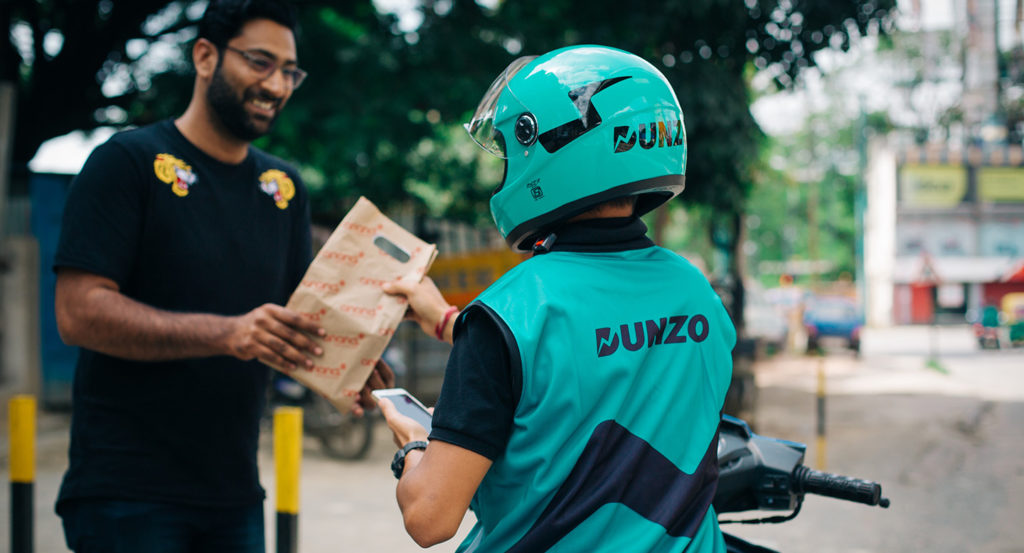Google-backed Dunzo is being built on a simple yet grand vision: becoming the last-mile logistics layer for India’s Top 25 cities. Its proposition to consumers is straightforward – don’t waste your time running errands; just leave it to Dunzo. But that’s not all…

The genesis of Dunzo was a WhatsApp group started way back in 2014 by Kabeer Biswas. For Biswas, it was a way to cut down on his own to-do list. He started taking requests for various tasks and deliveries across all areas in Bengaluru. These tasks included food delivery, medicine delivery, picking up flowers, party supplies and much more. When requests started flooding on Biswas’ WhatsApp, he knew it was time to scale up. It was the simplest pilot that he could run, and it had become a craze. In fact, people would simply “dunzo” things from one place to another – simply because it was cool.
With the help of his co-founder, Dalvir Suri, he enlisted Dunzo into a formal entity which connects users to the nearest delivery partner for local deliveries. It was later funded by Blume Ventures and the two-member team expanded further and Mukund Jha (CTO) and Ankur Aggarwal joined the company to build stronger product and tech.
The company has grown 30x in the last 18 months and as of June 2019 completed two million orders. The company claims it has an extremely active user base – wherein over 80 percent of its users use Dunzo more than five times a month.
Till date, the company has cumulatively raised US $76 million in funding, and its investors include Lightbox Ventures, Google, 3L Capital, STIC Investment & STIC Ventures, in addition to all its early-stage investors. The company raised its last round of US $45 million in Oct 2019.
While all this funding can be a distraction, Biswas is undeterred. He has a very simple short-term goal: “We aim to get one micro-market profitable at an order level in the next quarter,” he says.
Of course, the long-term vision to recreate this in India’s Top 25 cities, virtually becoming the last-mile logistical layer for the entire city.
Currently, the two players to watch out for in the last-mile deliver space are Swiggy and Zomato Order. Both these brands have mastered the restaurant delivery experience, but challenges remain in terms of unit economics and utilization of on-ground delivery partner. With Dunzo, broad-basing the fleet to deliver anything and everything may just be what’s needed. But only time will tell.
India sees about 600 million monthly commercial transactions, 90 per cent of which are still offline. Over the long-term, with Dunzo, we aim to digitize majority of offline transactions that are happening locally and drive commerce for the micro-economy.
Two-Sided Tech Play
While Dunzo’s core value proposition is for the end-customer, who uses the app to make a delivery or purchase or a pick-up or drop. But that’s not the only side of the equation.
For Dunzo, the real opportunity lies in enabling a local business to scale up by not only adding a delivery layer, but also giving them the tools to plan inventory, drive marketing and supplement its walk-in business.
Think a small fruits and vegetable vendor with no tech. By listing on the Dunzo platform, the vendor is able to access a wide-range of new customers who may not walk-in to the retail outlet. By giving the vendor, the right education and tools (predictive inventory and marketing offers, for example), the business has the potential to scale up, thanks to Dunzo.
For Dunzo, we believe this will be the greatest opportunity. But this requires two critical aspects to workout. One, building up a robust technology platform that can be used by small retailers. And, two, the ability to build a feet-on-street sales force that can educate and simplify this conversation with merchants.
Of course, for the more mature retailers (Food World or Sunnybee, for example) – they could possibly integrate their system to Dunzo’s API.
Not without challenges
Logistics is one of the greatest challenges in India and for a logistics company, building a strong supply chain and creating sufficient demand is the biggest hurdle. “It’s a chicken and egg problem that every hyperlocal delivery platform is trying to solve for. Ultimately, the idea is to deliver anything in the most efficient cost and time,” says Biswas. As a company, Dunzo wants to ensure that its three stakeholders – merchants, partners and customers, have seamless experiences. This is, of course, easier said.
Commenting about competition, Biswas says, “For Dunzo, everyone is competition as it’s currently the only full-stack company in the country. It’s focussed on expanding its services by bringing offline merchants online and solving customer pain points.”
It’ll be interesting to check how Swiggy scales up its offering and whether it goes beyond restaurant food delivery. There’s also that potential competition from bike taxi operators, who may double up as both logistics partners and delivery personnel.

Where to from here?
“India has 600 million monthly commercial transactions, 90 per cent of which are still offline. At Dunzo, we aim to digitize majority of offline transactions that are happening locally and drive commerce for the micro-economy,” says Biswas. By doing so, the company aims to enable local, offline merchants to be a part of the digital marketplace and be able to withstand the pressure from large and mid-size e-commerce and retail companies.
In Brief: Dunzo
Founders: Kabeer Biswas
Year of Founding: 2015
Headquarters: Bengaluru
Funding: Blume Ventures, Lightbox Ventures, Google, 3L Capital, STIC
About the business: Dunzo, a hyperlocal delivery startup, lets users outsource the most mundane of errands – from ordering a pack of chips to getting a clock repaired or laundry done—to its army of bike-owning delivery personnel. Over the long-term, the company aims to go beyond being the logistics layer for a city, by serving local retailers and merchants to put up their inventory on the Dunzo app and driving more customers through the digital route. It aims to build a two-sided business, on one side helping small merchants grow their businesses while also making life simpler for its users.